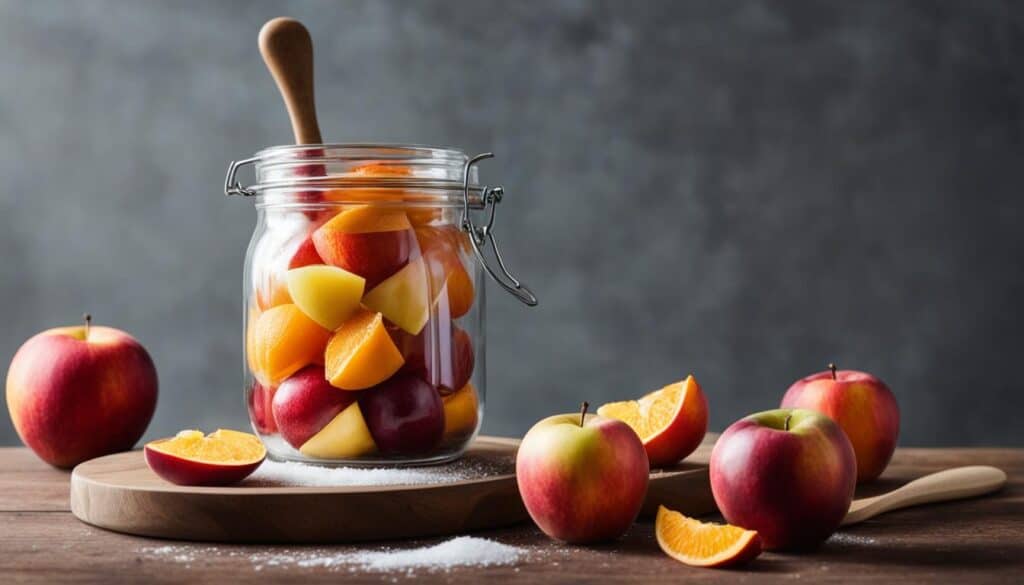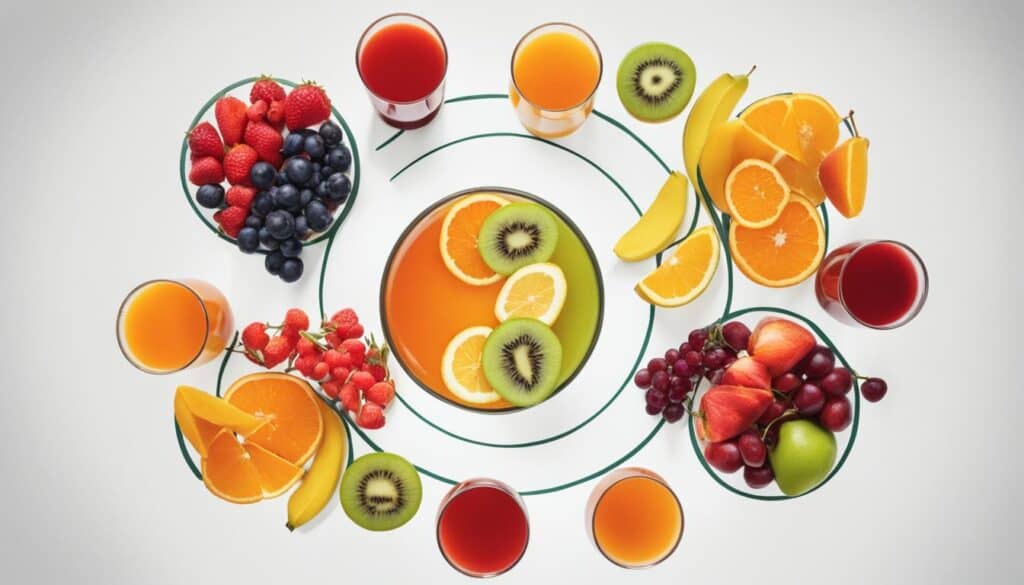Have you ever wondered what exactly fruit nectar is? Well, you’ve come to the right place. In this article, I will explain everything you need to know about fruit nectar and its deliciously juicy details.
Key Takeaways:
- Fruit nectar is a flavorful alternative to juice, made from pure fruit.
- When purchasing fruit nectar, it’s important to read the nutrition facts label and ingredient list to ensure it is 100% fruit juice.
- Fruit nectar does not contain dietary fiber, so portion sizes should be monitored.
- Popular fruit nectar brands include Tropicana, Ocean Spray, and Welch’s.
- Fruit nectar provides essential vitamins and minerals, such as vitamin C, calcium, and potassium.
Types of Fruit Nectar
Fruit nectar comes in a delightful array of flavors, ensuring there’s something for everyone’s taste buds. Whether you prefer the tangy zest of orange, the crispness of apple, the richness of grape, or the sweetness of cherry, you’ll find a fruit nectar flavor that satisfies your cravings.
When it comes to fruit nectar, different brands offer various options to suit individual preferences. Some brands provide concentrated fruit nectar, which delivers a more intense flavor profile. Others offer diluted options for a lighter taste. With the wide range of choices available, you can find the perfect fruit nectar to quench your thirst and delight your taste buds.
To help you explore the world of fruit nectar, here are some popular brands that offer a diverse selection of flavors:
- Tropicana: Known for their high-quality fruit juices, Tropicana also offers a range of fruit nectar options that are bursting with flavor.
- Ocean Spray: Ocean Spray is renowned for its cranberry offerings, but they also produce a variety of fruit nectars that are both refreshing and delicious.
- Welch’s: Welch’s is a trusted brand that offers a wide range of fruit-based beverages, including fruit nectars that deliver exceptional taste.
With these popular fruit nectar brands, you can explore a world of flavors and find the perfect fruit nectar to elevate your beverage experience.
Benefits of Fruit Nectar
Fruit nectar offers numerous health benefits due to its rich nutritional content. Incorporating fruit nectar into your diet can be a convenient way to meet your daily fruit intake recommendations while enjoying a burst of fruity flavor. Let’s explore some of the key benefits:
1. Essential Vitamins and Minerals
Fruit nectar provides a concentrated source of essential vitamins and minerals found in fruits. One notable nutrient found in fruit nectar is vitamin C, which plays a crucial role in supporting a healthy immune system. It helps protect against common illnesses and supports the body’s natural defenses.
In addition to vitamin C, fruit nectar also contains other beneficial nutrients like calcium and potassium. Calcium is vital for maintaining strong bones and teeth, while potassium supports healthy heart function and aids in maintaining proper fluid balance in the body.
2. Convenient Fruit Intake
Meeting the recommended daily intake of fruits can sometimes be challenging. Fruit nectar offers a convenient solution by providing a concentrated form of fruit juice. It allows you to consume a significant amount of fruit nutrients in a single serving.
3. Tasty and Refreshing
One of the main advantages of fruit nectar is its delicious taste and refreshing nature. It can be enjoyed on its own or used as a base for flavorful smoothies or cocktails. Including fruit nectar in your daily routine can make staying hydrated a delightful experience.
4. Antioxidant Properties
Fruit nectar, like its fruit counterparts, contains antioxidants that help protect the body against cell damage caused by harmful molecules called free radicals. Regular consumption of antioxidant-rich foods, including fruit nectar, can contribute to maintaining optimal health and well-being.
It is worth noting that while fruit nectar offers numerous health benefits, it is essential to keep an eye on the nutrition facts label. Some fruit nectars may contain added sugars and sodium. Monitoring your intake and opting for products with lower sugar and sodium content can help ensure you make the most of the health benefits that fruit nectar provides.
| Benefits of Fruit Nectar |
|---|
| Convenient way to meet daily fruit intake recommendations |
| Rich in essential nutrients like vitamin C, calcium, and potassium |
| Offers antioxidant properties |
| Tasty and refreshing |
Ingredients and Nutrition of Fruit Nectar
Fruit nectar is a delicious and refreshing beverage made from the juice of various fruits. These fruits are processed into a concentrated form, resulting in the vibrant flavors that fruit nectar is known for. While the specific ingredients of fruit nectar can vary between different brands and flavors, one common ingredient is water. When the juice is made from concentrate, water is often the first ingredient listed on the label.
It’s important to note that fruit nectar does not contain dietary fiber. Unlike whole fruits, which contain fiber that aids in digestion, fruit nectar lacks this important component. However, it still offers valuable nutritional content in the form of essential vitamins and minerals.
The nutrition facts of fruit nectar can vary depending on the brand and flavor. It’s essential to check the labels for specific details on calories, sugars, and other nutrients to make informed choices. Let’s take a closer look at some popular fruit nectar brands and their nutritional profiles:
| Brand | Flavor | Serving Size | Calories | Sugar (g) | Vitamin C (mg) | Potassium (mg) |
|---|---|---|---|---|---|---|
| Tropicana | Orange | 8 fl oz | 110 | 26 | 100 | 450 |
| Ocean Spray | Cranberry | 8 fl oz | 120 | 28 | 0 | 5 |
| Welch’s | Grape | 8 fl oz | 140 | 34 | 100 | 200 |
Table: Nutritional profiles of popular fruit nectar brands
As shown in the table, the calorie and sugar content can vary among different fruit nectar brands and flavors. While fruit nectar can be a tasty addition to a balanced diet, it is important to consume it in moderation, especially if you are watching your calorie and sugar intake.
How to Make Fruit Nectar
I love making my own fruit nectar at home. It’s a fun and rewarding process that allows me to enjoy the pure and refreshing flavors of fresh fruits. Plus, it’s a great way to customize the taste according to my preferences. Here’s how you can make your own fruit nectar:
- Select your favorite fruits: Choose ripe and juicy fruits that you enjoy. Some popular options include oranges, apples, strawberries, and pineapples.
- Prepare the fruits: Wash the fruits thoroughly to remove any dirt or pesticides. Remove the stems, seeds, and skin as needed.
- Juice the fruits: Use a juicer or blender to extract the juice from the fruits. Make sure to strain the juice to remove any pulp or seeds.
- Taste and adjust: Take a small sip of the juice and adjust the sweetness or tartness according to your preference. You can add a touch of honey or lemon juice to balance the flavors.
- Dilute if desired: If the juice is too strong or concentrated, you can dilute it with some water. This will make the fruit nectar lighter and more refreshing.
And voila! Your homemade fruit nectar is ready to be enjoyed. You can drink it as is or add it to smoothies, mocktails, or even use it as a base for homemade popsicles. Get creative and have fun exploring different flavor combinations.

Remember, making fruit nectar at home gives you complete control over the ingredients and sweetness levels. It’s a healthier alternative to store-bought options that may contain preservatives or added sugars. So, grab your favorite fruits and start creating your own delicious fruit nectar!
Fruit Nectar vs. Fruit Juice
When it comes to choosing between fruit nectar and fruit juice, it’s essential to understand the differences. While both are derived from fruit, their composition and flavors vary.
Fruit Juice:
Fruit juice is typically made from 100% pure fruit, with no added flavors or dilution. It is obtained by extracting the liquid from the fruit, including the pulp and skin. This extraction process ensures that the juice retains the natural fiber content of the fruit. The result is a refreshing and nutrient-rich beverage.
Fruit Nectar:
Fruit nectar, on the other hand, may contain added flavors or be diluted with water. The pulp and skin of the fruit are generally removed during the production process, resulting in a smoother and less fibrous consistency. The addition of flavors or dilution can enhance the taste, offering a wide range of flavor options.
When deciding between fruit nectar and fruit juice, it’s essential to consider your preferences and nutritional needs. Fruit juice is an excellent choice for those looking for a natural and fiber-rich beverage. On the other hand, fruit nectar provides a flavorful alternative with various taste options.
“Fruit juice is a refreshing and nutrient-rich beverage, while fruit nectar offers a wide range of flavors.”
To make an informed choice, it’s vital to read the labels and ingredient lists of both fruit nectar and fruit juice products. This will help you understand the composition and determine which option aligns better with your dietary preferences and goals.
Comparison Table: Fruit Nectar vs. Fruit Juice
| Fruit Nectar | Fruit Juice |
|---|---|
| May contain added flavors or be diluted | 100% pure fruit juice with no added flavors or dilution |
| Smooth texture, with the pulp and skin usually removed | Includes the pulp and skin, resulting in a more fibrous texture |
| Wide range of flavor options | Natural flavor of the fruit |
| May have a lower fiber content | Retains the natural fiber content of the fruit |

As seen in the comparison table above, fruit nectar and fruit juice have distinguishing characteristics. Each option offers a unique taste experience and nutritional profile. Ultimately, the choice between fruit nectar and fruit juice depends on personal preferences, dietary restrictions, and health goals.
Fruit Nectar and Health
Fruit nectar can be a delicious and nutritious addition to a balanced diet. It offers a range of health benefits that can support overall well-being. Here are some of the key ways that fruit nectar can contribute to your health:
Vitamins and Minerals
One of the primary benefits of fruit nectar is its rich content of essential vitamins and minerals. Fruits are naturally packed with nutrients, and when transformed into nectar form, these beneficial compounds are still present. Fruit nectar is particularly high in vitamin C, which is known for its immune-boosting properties. It also contains other important vitamins like vitamin A and vitamin K. Additionally, fruit nectar can provide minerals such as potassium and calcium, which contribute to various bodily functions.
Convenience and Fruit Intake
Consuming fruit nectar can be a convenient way to meet your daily fruit intake recommendations. In today’s fast-paced lifestyle, it can sometimes be challenging to incorporate the recommended amounts of fruits into our meals. Fruit nectar offers a quick and easy solution, allowing you to enjoy the flavors and benefits of fruits in a convenient form. Whether you’re on the go or simply prefer the taste of fruit nectar, it can help ensure you’re getting a sufficient amount of fruit in your diet.
Moderation and Added Sugars
While fruit nectar can offer health benefits, it’s essential to consume it in moderation. Some fruit nectars contain added sugars, which can contribute to excessive calorie intake and potential health problems. When selecting fruit nectar, it’s crucial to read the nutrition facts label and ingredient list to be aware of any added sugars in the product. Limiting your intake of fruit nectar to appropriate portion sizes can help you enjoy its benefits without overconsumption of sugars.
Overall, fruit nectar can be a flavorful and nutritious part of a well-balanced diet. By considering portion sizes, choosing options with minimal added sugars, and incorporating a variety of fruits and vegetables, you can enjoy the health benefits that fruit nectar has to offer.

Fruit Nectar and Children
When it comes to children’s consumption of fruit nectar, caution is advised due to its high sugar content. Some fruit nectars may contain added sugars, including high-fructose corn syrup, which can contribute to negative health effects. It is essential for parents and caregivers to monitor the amount of natural sugars in fruit nectar, as some fruits are naturally high in sugar.
Limiting the amount of fruit juice or fruit nectar children consume daily is recommended to prevent excessive sugar intake. This is particularly important considering the potential impact on dental health and the risk of childhood obesity. A balanced diet for children should include a variety of whole fruits, which provide essential vitamins, minerals, and dietary fiber.
It is important to note that fruit nectar should not be used as a substitute for whole fruits in a child’s diet. While fruit nectar can be a part of a healthy diet when consumed in moderation, it is essential to consider the overall sugar content and balance it with other nutritious foods and beverages.
| Fruit Nectar and Children Recommendations |
|---|
| Limit the amount of fruit juice or fruit nectar children consume daily |
| Include a variety of whole fruits in their diet to provide essential vitamins, minerals, and dietary fiber |
| Monitor the natural sugar content in fruit nectar and choose options with lower sugar content |
| Promote dental health by encouraging regular brushing and limiting sugary beverages |
| Encourage children to drink water as the primary beverage choice |
As a loving parent or caregiver, it is important to prioritize your child’s health and make informed choices when it comes to their diet. By being mindful of their fruit nectar consumption and promoting a balanced and varied diet, you can support their overall well-being.

Fruit Nectar and Weight Management
When it comes to maintaining a healthy weight, it’s essential to be mindful of the calories and sugars in the beverages we consume. While fruit nectar can be a delicious and refreshing choice, it’s important to moderate our intake to support our weight management goals.
Fruit nectar can contain added sugars, which can contribute to unhealthy weight gain if consumed in excessive amounts. The calories in fruit nectar can quickly add up, especially if we consume multiple servings throughout the day.
It’s important to balance fruit nectar consumption with other nutritious foods and beverages to ensure we’re meeting our overall dietary needs.
The Role of Portion Control
Portion control plays a crucial role in managing our calorie intake. While it’s tempting to enjoy a large glass of fruit nectar, it’s essential to be mindful of our portions. Opting for smaller serving sizes can help prevent overconsumption of calories and sugars.
Moderation is key when it comes to enjoying fruit nectar without compromising our weight management goals.
Choosing Lower Calorie Options
Some fruit nectars may have lower calorie options available, which can be beneficial for those watching their weight. These lower calorie alternatives can still provide the refreshing taste of fruit nectar while reducing the overall calorie intake.
| Brand | Product | Calories per Serving |
|---|---|---|
| Tropicana | Low Calorie Orange Nectar | 50 |
| Welch’s | Reduced Sugar Grape Nectar | 60 |
| Minute Maid | Light Apple Nectar | 40 |
Note: Please refer to the product labels for the most accurate and up-to-date nutritional information.
Incorporating Physical Activity
Alongside moderate fruit nectar consumption, incorporating regular physical activity into our lifestyle can support weight management efforts. Physical activity helps burn calories and maintain a healthy balance between energy intake and expenditure.
“Finding a balance between enjoying fruit nectar and following a healthy, active lifestyle is the key to successful weight management.” – Nutritionist Sarah Roberts

By being mindful of our portion sizes, choosing lower calorie options, and incorporating physical activity, we can enjoy fruit nectar as part of a well-rounded and balanced approach to weight management.
Fruit Nectar and Dietary Guidelines
The dietary guidelines recommend consuming a variety of fruits as part of a healthy diet. Fruit nectar can be a source of essential vitamins and minerals, but it should not replace whole fruits in the diet. Whole fruits provide dietary fiber, which is important for digestive health. Fruit nectar should be consumed in moderation and as part of a well-balanced diet.
When following the dietary guidelines, it is important to prioritize whole fruits over fruit nectar. Whole fruits contain dietary fiber, which aids in digestion and supports overall gut health. While fruit nectar may provide some of the same vitamins and minerals as whole fruits, it lacks the fiber content.
Remember:
- Choose whole fruits for their fiber content and consume fruit nectar in moderation.
- Consider incorporating a variety of whole fruits into your diet to ensure you get a wide range of nutrients.
- Avoid relying solely on fruit nectar as a source of fruit intake and make sure to include other sources, such as fresh or frozen fruits.
Fruit nectar can be a refreshing and convenient option, especially when whole fruits are not readily available. However, it is important to prioritize whole fruits in the diet to reap the full range of health benefits they provide.
| Fruit Nectar | Whole Fruits | |
|---|---|---|
| Vitamins and Minerals | Contains essential vitamins and minerals | Provides a wide range of vitamins and minerals |
| Fiber | Does not contain fiber | High in dietary fiber |
| Digestive Health | Lacks fiber content, which is important for digestive health | High fiber content supports a healthy digestive system |
| Variety | Comes in a variety of flavors | Offers a wide range of fruit options |
Table: Comparing Fruit Nectar and Whole Fruits
While fruit nectar can be enjoyed as part of a well-balanced diet, it should not be relied upon as the sole source of fruit intake. By incorporating whole fruits into your daily routine, you can maximize the health benefits and ensure you are getting the most nutrients possible.
Conclusion
In summary, fruit nectar is a delicious and nutritious beverage made from pure fruit. It offers a refreshing alternative to traditional fruit juices and provides essential vitamins and minerals. However, it’s important to consume fruit nectar in moderation, as portion sizes and added sugars should be taken into consideration.
While fruit nectar can be a part of a healthy diet, it should not replace whole fruits. Whole fruits contain dietary fiber, which is important for digestive health. So, it’s recommended to include a variety of fruits in your diet to reap the benefits of both fruit nectar and the fiber-rich goodness of whole fruits.
When selecting fruit nectar products, it’s crucial to read the labels and ingredient lists. Look for options that are 100% fruit juice and contain minimal added sugars. Making informed choices will help you enjoy the benefits of fruit nectar while keeping your dietary goals in mind.
So, whether you’re looking for a tasty twist on your usual juice or a convenient way to increase your fruit intake, fruit nectar is a great choice. With its tantalizing flavors and nutritional benefits, it’s a win-win for both your taste buds and your health!
FAQ
What is fruit nectar?
Fruit nectar is a flavorful alternative to juice that is made from pure fruit.
What are the types of fruit nectar?
Fruit nectar comes in a variety of flavors, including orange, apple, grape, and cherry. Different brands may offer different variations of fruit nectar, such as concentrated or diluted options. Some popular fruit nectar brands include Tropicana, Ocean Spray, and Welch’s.
What are the benefits of fruit nectar?
Fruit nectar provides essential vitamins and minerals found in fruits. It is a convenient way to meet daily fruit intake recommendations. Fruit nectar is rich in vitamin C, which supports a healthy immune system. It also contains other beneficial nutrients like calcium and potassium. However, it is important to check the nutrition facts label for added sugars and sodium content.
What are the ingredients and nutrition of fruit nectar?
Fruit nectar is made from the juice of various fruits, which are processed into a concentrated form. The ingredients are listed in descending order of weight, so water may be the first ingredient if the juice is from concentrate. Fruit nectar does not contain dietary fiber. The nutrition content can vary between different brands and flavors of fruit nectar.
How can I make fruit nectar?
Fruit nectar can be made at home by juicing fresh fruits and straining out any pulp or seeds. The juice can be consumed as is or diluted with water to taste. Recipes for homemade fruit nectar can be found online, and variations can be made based on personal preferences.
What is the difference between fruit nectar and fruit juice?
Fruit nectar and fruit juice are similar in that they are both made from fruit, but there are some differences. Fruit juice is typically 100% pure juice, while fruit nectar may be diluted or contain added flavors. Fruit juice may contain more fiber than fruit nectar, as the pulp and skin are often included. It is important to read the labels and ingredient lists to understand the composition of each product.
Is fruit nectar healthy?
Fruit nectar can be part of a healthy diet when consumed in moderation. It provides essential vitamins and minerals and can be a convenient way to meet daily fruit intake recommendations. However, it is important to be mindful of portion sizes and added sugars. Fruit nectar should be consumed as part of a well-balanced diet that includes a variety of fruits and vegetables.
Should children consume fruit nectar?
Children should be cautious with their fruit nectar consumption due to the high sugar content. Some fruit nectars may contain added sugars from high-fructose corn syrup. Monitoring the amount of natural sugars in fruit nectar is important, as some fruits are naturally high in sugar. It is recommended to limit the amount of fruit juice or fruit nectar children consume daily.
Can fruit nectar contribute to weight gain?
While fruit nectar can be part of a healthy diet, it is important to be mindful of the calories and sugars it contains. Consuming too much fruit nectar, especially those with added sugars, can contribute to unhealthy weight gain. Moderation is key, and it is important to balance fruit nectar consumption with other nutritious foods and beverages.
Can fruit nectar replace whole fruits in the diet?
The dietary guidelines recommend consuming a variety of fruits as part of a healthy diet. Fruit nectar can be a source of essential vitamins and minerals, but it should not replace whole fruits in the diet. Whole fruits provide dietary fiber, which is important for digestive health. Fruit nectar should be consumed in moderation and as part of a well-balanced diet.





Leave a Reply